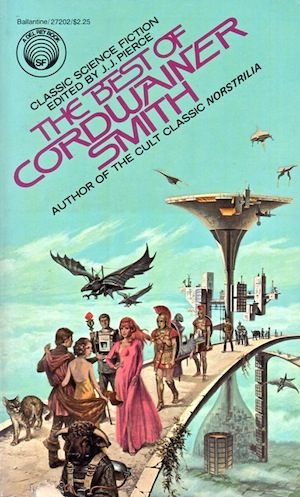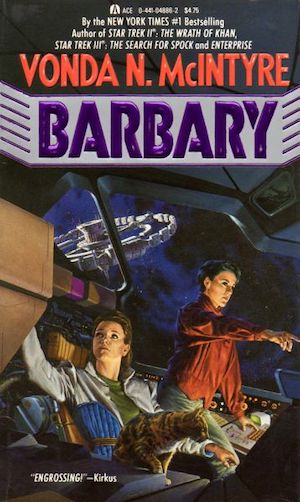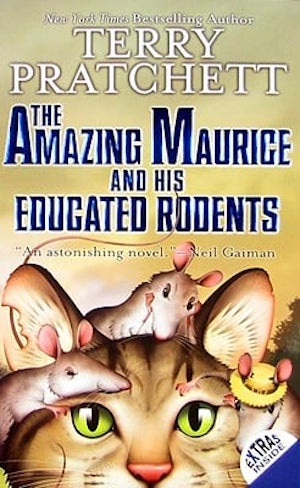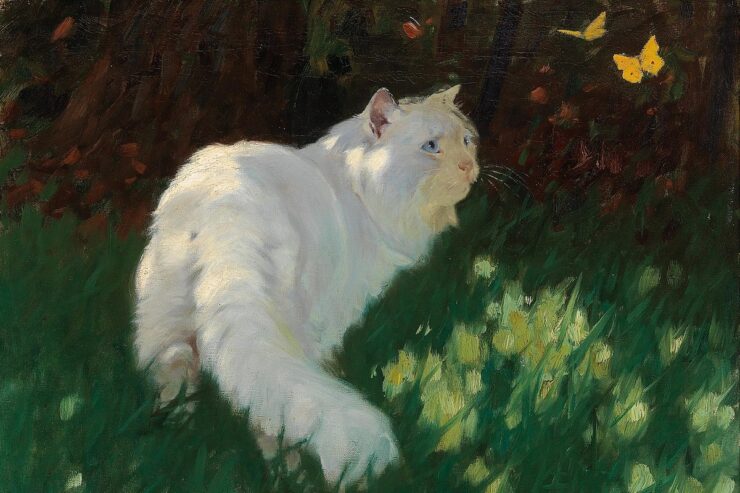Every week, I put up a list on my own website of the books/novellas/games/etc. I have bought or been sent that week. I also put up a poll on Dreamwidth asking readers which works sound interesting to them. I also include one control category: “Cats.” Consistently, the cats option proves more popular than any other book or work.
This is no surprise. Cats provide pest control, affectionate companionship, timekeeping (provided one cares only about feeding time), and in a pinch, alternative funerary services. No surprise that in the millennia since cats began associating with humans, they have spread around the globe. Nor is it a surprise to discover that cats1 appear quite frequently in speculative fiction2. Consider these five works.
“The Game of Rat and Dragon” by Cordwainer Smith (1955)

(Collected in Supernatural Cats and The Best of Cordwainer Smith, among others.) Deepest space is the domain of dragons, intangible beings who inflict madness and death on hapless human travelers. Intense light kills dragons… or it would, if it weren’t for the fact that dragons are too swift to target. Alone, humans would be doomed.
Humans are not alone. From the POV of humanity’s telepathic feline companions like Captain Wow and Lady May, dragons are merely peculiar rats. The cats’ psionic senses can spot rats or dragons and alert their doting human allies within milliseconds. Rat or dragon, with the cats on stage, the predators are doomed.
Why the story about Captain Wow and Lady May, and not the ones featuring girly-girl C’Mell? Because while cats might be people, cats and cat people are different and deserve their own separate essays.
Alien by Ridley Scott (dir.) and Dan O’Bannon (screenwriter) (1979)
Investigating a mysterious transmission, commercial space tug Nostromo discovers an alien craft. Within the craft are alien eggs the humans should not have investigated as closely as they did. One egregious violation of basic safety protocol later, and a ravenous alien predator begins picking off the delectable hapless human crew, one by one.
In addition to the humans, Nostromo has a feline crewmember, Jones. Far more sensible than most of its human companions, Jonesy prudently avoids the alien. Not merely that, but by graciously permitting Warrant Officer Ellen Ripley to convey Jones to a lifeboat, the heroic cat saves Ripley’s life.
No doubt Ripley would tell a slightly different version of the events. But consider: Jonesy is the only protagonist of the first movie to survive the franchise because it is the only protagonist that exits the series as soon as escape is practical. What’s more likely, that the cat saved the human or that the human somehow fumbled their way into saving the cat?
Barbary by Vonda McIntyre (1986)

Orphan Barbary’s constant companion is her cat, Mickey. Barbary takes Mickey with her from foster home to foster home. This becomes problematic when Yoshi and Thea offer Barbary a new home. Yoshi and Thea live in a space station. Pets are not allowed.
Barbary is ingenious enough to smuggle Mickey on board, but keeping Mickey hidden proves more difficult. Luckily for Mickey, like many previous human domiciles, the station has rats. Mickey earns a place in a traditional role as pest control. Not content with this, Mickey also takes an unexpected central role in a first contact situation.
Fortunately for humanity, allergic reactions to cat dander are not a universal trait.
The Amazing Maurice and His Educated Rodents by Terry Pratchett (2001)

The feline Maurice, his rat companions, and their human boy Keith have human-level intelligence. They use this to exploit gullible humans. They arrive in a new town where the cunning rats stage a distressing rodent infestation. Keith and Maurice then make the problem vanish in return for reasonable renumeration.
The troupe arrives in Bad Blintz to discover that the town has an existing rat problem and also established rat catchers. Curiously, despite abundant evidence of an infestation, Maurice’s educated rats find little evidence of actual rats. Have Maurice and company encountered a rival group of con artists? The truth is far worse.
There are many stories about talking animals that simply walk past, eyes averted, the fact that some animals are predators while others are prey. This is not one of those books.
When a Cat Faces West by Yuki Urushibara (2018-2020)

Flows (transient reality warps) bedevil Japan. While Flow is rarely lethal, often not even dangerous, it makes life much more difficult. One discovers that all corners (including blade edges) have suddenly vanished, or that one has been transformed from adult to tween. Hence the existence of Flow disposal officials.
Flow disposal expert Hirato relies on a combination of expertise and sloth. Experience has shown him that most Flow vanishes on its own as long as humans do not exacerbate the situation. However, there are exceptions. He deals with the exceptions. His partner in this enterprise? His cat Shacho, who has a well-honed ability to sense Flow.
(Note: in many manga it’s not clear if the cats are toms or queens. Shacho is unambiguously a tomcat.)
Of course, there are many science-fictional and fantastic cats I could have mentioned but did not. In some cases I had good reason—Space Cat got his own essay years ago; and while I enjoyed horror author’s Junji Ito’s touching Junji Ito’s Cat Diary: Yon & Mu, the manga is entirely mundane despite the impression Junji Ito’s art might give. I am sure I’ve missed many reader favorites. Feel free to inform us all in the comments below.
- Cat people form a different, although closely related, category. ↩︎
- Of course, works about cats are found everywhere, not just in spec fic. Noted SF author Xiran Jay Zhao kindly introduced many lucky people to the cat poems of Song Dynasty poet Lu You, a man who having acquired a cat to manage his rat problem soon found himself its servant. ↩︎










